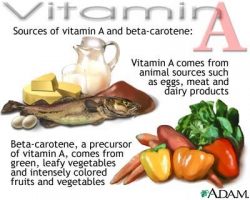 Vitamin A is a fat-soluble vitamin that is derived from two sources: preformed retinoids and provitamin carotenoids. Retinoids, such as retinal and retinoic acid, are found in animal sources like liver, kidney, eggs, and dairy produce. Carotenoids like beta-carotene (which has the highest vitamin A activity) are found in plants such as dark or yellow vegetables and carrots.
Vitamin A is a fat-soluble vitamin that is derived from two sources: preformed retinoids and provitamin carotenoids. Retinoids, such as retinal and retinoic acid, are found in animal sources like liver, kidney, eggs, and dairy produce. Carotenoids like beta-carotene (which has the highest vitamin A activity) are found in plants such as dark or yellow vegetables and carrots.
What do you need Vitamin A for?
Natural retinoids are present in all living organisms, either as preformed vitamin A or as carotenoids, and are required for a vast number of biological processes like vision and cellular growth. A major biologic function of vitamin A (as the metabolite retinal) is in the visual cycle. Research also suggests that vitamin A may reduce the mortality rate from measles, prevent some types of cancer, aid in growth and development, and improve immune function.
Recommended daily allowance (RDA) levels for vitamin A oral intake is between 3000 and 10000 IU (international Unites). At recommended doses, vitamin A is generally considered non-toxic. Excess dosing may lead to acute or chronic toxicity.
Vitamin A deficiency is rare in industrialized nations but remains a concern in developing countries, particularly in areas where malnutrition is common. Prolonged deficiency can lead to xerophthalmia (dry eye) and ultimately to night blindness or total blindness, as well as to skin disorders, infections (such as measles), diarrhea, and respiratory disorders.
Vitamin A is an antioxidant. Antioxidants are substances that may protect your cells against the effects of free radicals. Free radicals are molecules produced when your body breaks down food, or by environmental exposures like tobacco smoke and radiation. Vitamin A also plays a role in your
- Vision
- Bone growth
- Reproduction
- Cell functions
- Immune system
Vitamin A can come from plant or animal sources. Plant sources include colorful fruits and vegetables. Animal sources include liver and whole milk. Vitamin A is also added to foods like cereals.
Good Sources of Vitamin A
| Liver, beef, cooked, 3 ounces | 27,185 IU of Vitamin A |
| Liver, chicken, cooked, 3 ounces | 12,325 IU of Vitamin A |
| Carrot juice, canned, ½ cup | 22,567 IU of Vitamin A |
| Carrots, boiled, ½ cup slices | 13,418 IU of Vitamin A |
| Spinach, frozen, boiled, ½ cup | 11,458 IU of Vitamin A |
| Kale, frozen, boiled, ½ cup | 9,558 IU of Vitamin A |
| Carrots, 1 raw (7½ inches) | 8,666 IU of Vitamin A |
| Vegetable soup, canned, 1 cup | 5,820 IU of Vitamin A |
| Cantaloupe, 1 cup cubes | 5,411 IU of Vitamin A |
| Spinach, raw, 1 cup | 2,813 IU of Vitamin A |
| Apricots with skin, juice pack, ½ cup | 2,063 IU of Vitamin A |
| Apricot nectar, canned, ½ cup | 1,651 IU of Vitamin A |
| Papaya, 1 cup cubes | 1,532 IU of Vitamin A |
| Mango, 1 cup sliced | 1,262 IU of Vitamin A |
| Oatmeal, instant, fortified, plain, 1 cup | 1,252 IU of Vitamin A |
| Peas, frozen, boiled, ½ cup | 1,050 IU of Vitamin A |
| Tomato juice, canned, 6 ounces | 819 IU of Vitamin A |
| Milk, fortified skim, 1 cup | 500 IU of Vitamin A |
Vegetarians, young children, and alcoholics may need extra Vitamin A. You might also need more if you have certain conditions, such as liver diseases, cystic fibrosis, and Crohn’s disease. Check with your health care provider to see if you need to take vitamin A supplements.




